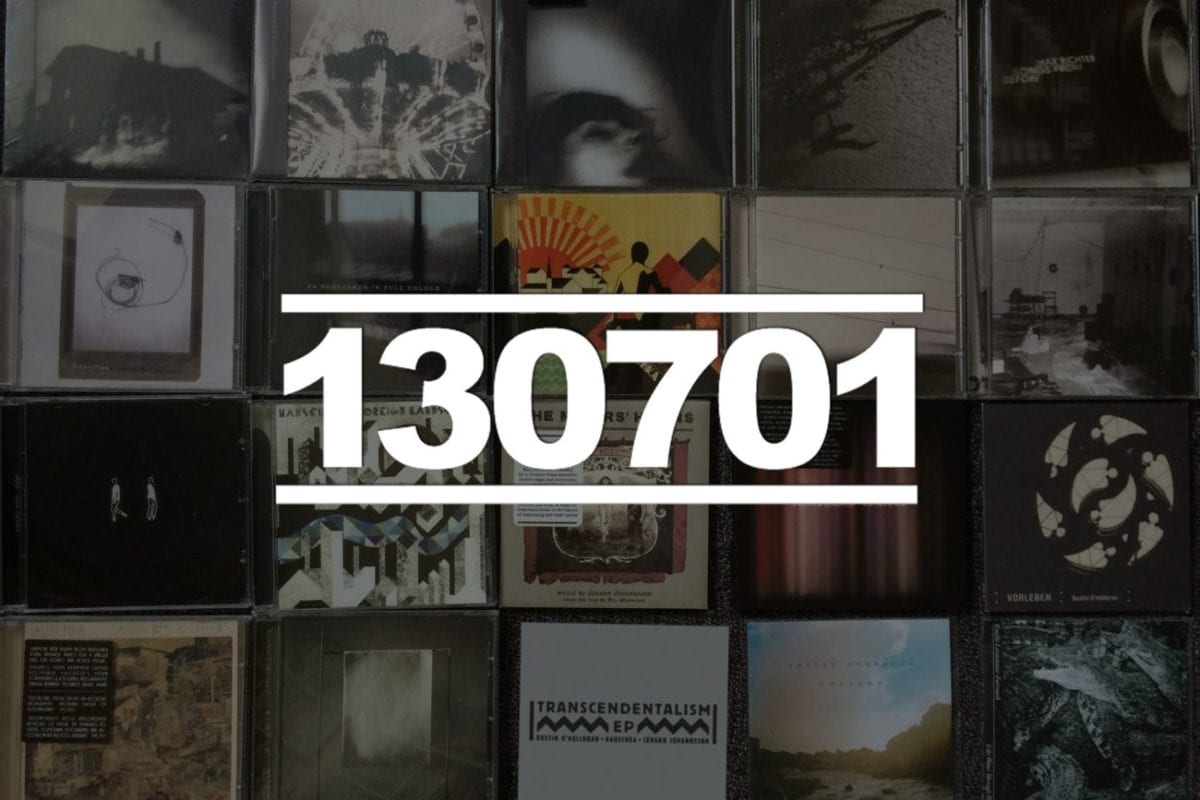
130701 can arguably lay the claim to having paved the way for the current generation of artists blurring the boundaries between classical composition and electronic aesthetics. Whilst labels and musicians exploring the fertile ground between concert halls traditions and electronic experimentation have become almost ubiquitous of late, fifteen years ago such hybridity remained almost wholly unimagined.
Opening its doors on the 13th July 2001 (hence ‘130701’, pronounced like the date), the sub-label of Brighton based imprint FatCat was born at a point in time when there wasn’t a blueprint for cross-genre “post-classical” experimentation. Instead, it was 130701 that would go onto to explore, spearhead and somewhat define this kind of experimentation between the two musical spheres. Signing artists such as Max Richter, Jóhan Jóhannsson, Hauschka and Dustin O’Halloran, the label established a flawless roster of artists and, keeping to an intermittent release schedule that valued quality over frequency, produced a broad catalogue of far-reaching records.
The label went into hibernation in 2012 and in the subsequent years has been (rather unfairly) overshadowed by the emergence of other labels working in the “post-classical” field. Yet, this autumn that all looks set to change. 130701 is relaunching with two studio albums from new signees: Muscovite prodigy Dmitry Evgrafov’s “Collage” and French pianist Emilie Levienaise-Farrouch’s “Like Water With Sand”. With the relaunch imminent, I spent some time chatting with Dave Howell, who has run the label since day one, to talk about the history of the label, its involvement in establishing one of the musical epochs of our time and what 130701 MKII is going to sound like. Dave has also selected some of his favourite tracks in this “130701: Pioneers of Post Classical” playlist, listen via YouTube or on Playmoss.
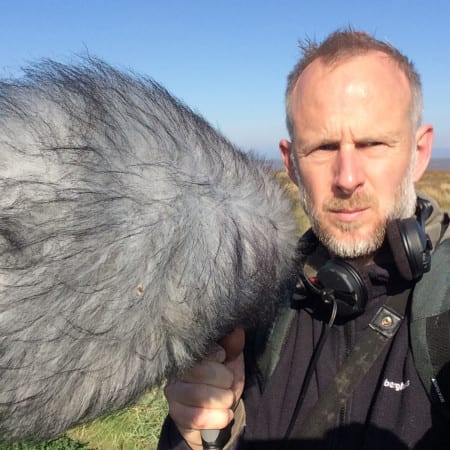
"We set up 130701 purely for the release of Set Fire To Flames album "Sings Reign Rebuilder" and named it 130701 because it was launched on 13th July 2001."
Tell me about how 130701 came into being and how you became involved with it.
Before FatCat became a record label, it was a really important record store in Covent Garden where I used to shop. It was a very engaged, hugely influential London hub for electronic music during that early-mid ‘90s period, similar to how Hard Wax were in Berlin.
The shop closed in 1997 and Dave [Cawley] and Alex [Knight, who both ran the shop] set up FatCat as a label. I had been writing an electronica / post-rock fanzine called Obsessive Eye, which they’d stocked and they invited me to come and help run the label.
In 2000 I was contacted by David Bryant of Godspeed You Black Emperor! who had made a record alongside twelve other people from that Montreal scene and was looking for a home for it. [The ensemble] were called Set Fire To Flames and the album was “Sings Reign Rebuilder“ – this sprawling, stunning record, I loved instantly. The band had very strong ethics and refused to be connected with anyone that had any links to dodgy corporations or to the military industrial complex.
At that time we were funded by a larger label / distributor who were themselves funded by a bigger company it turned out had connection to arms trade somewhere down the line. So we set up 130701 purely for the release of Set Fire To Flames album “Sings Reign Rebuilder“ and named it 130701 because it was launched on 13th July 2001.
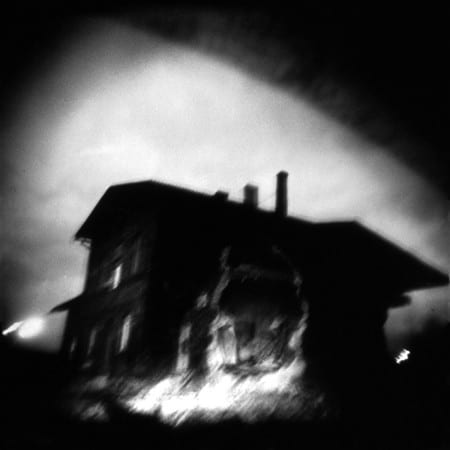
"We’ve only released 17 or 18 records in just under 15 years, but every one of those is a great record, there’s no dip.."
Did you have any plans for carving out a distinct aesthetic for the label?
No, not initially. It was only after having put out the first three or four records that it began to accrue an identity. Listening back, the Set Fire To Flames albums sound quite different to later releases. The album “Sings Reign Rebuilder” had been recorded over a period of several days in this centuries-old, creaking wooden house that used to be a brothel and where David Bryant was living.
They’d made these long, group recordings there – studies in longform improvisation, just leaving the tape running, playing for 12 hour stints and then editing things down and compiling it all quite brilliantly: a mixture of guitars, electronics, percussion, strings, brass, woodwind, field recording. The sleeve artwork was this haunting black and white photograph by Michael Ackerman.
After that first release we put out a beautiful, discrete album of piano, electronics and looped guitar from French artist Sylvain Chauveau, and again we used a monochrome cover photo. Shortly after a second Set Fire To Flames album, we discovered Max Richter, and the aesthetics / identity of the label started to cohere around both the use of photography and the idea of classical instrumentation being used in expansive, adventurous, non-traditional ways.
So we set those parameters and an intention to curate this imprint with the quality control bar kept really high and only putting out releases when we had something strong enough, rather than just putting something out every couple of months. We’ve only released 17 or 18 records in just under 15 years, but every one of those is a great record, there’s no dip.
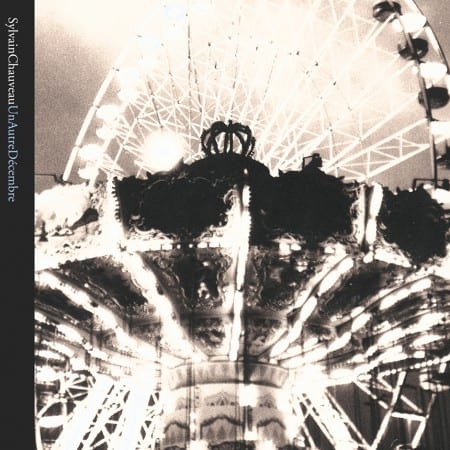
"To my mind, as a label, 130701 really helped pioneer that post-classical scene. I’m not saying it wouldn’t have happened without us. But we were the first to pull those artists together and give it a home, a proper focus."
These days there is a burgeoning post-classical scene, but back in the early ‘00s was there the sense that you were out on a limb?
There wasn’t really a template for what we were doing back then. In the mid-90s there was a band called Rachel’s who I loved, who were this singular, chamber music trio from Louisville very much out on their own on a Touch And Go imprint – but I wasn’t really aware then of anyone else mining that kind of sound.
To my mind, as a label, 130701 really helped pioneer that post-classical scene. I’m not saying it wouldn’t have happened without us. But we were the first to pull those artists together and give it a home, a proper focus.
Shortly after the first Max Richter record in 2004 you could start to sense a bit of a scene developing with the emergence of other artists and labels like Type, who I love, and then a few years after that Erased Tapes.
But back in 2004 it really did feel like we were there at the start of this new “thing” and you could see it beginning to gain public interest, particularly with Max’s music being widely synched on TV, film and radio. Obviously, the last few years that scene has totally mushroomed, culminating most recently in the massive media feed around Max Richter’s ‘Sleep’ and the BBC 6 Music Proms [with Nils Frahm and A Winged Victory For The Sullen], which feels like some kind of tipping point.
I feel like we’ve missed out on all that attention because the label’s been on hiatus from 2012 until now. In that time, the ‘scene’ has received lots of press coverage but very little has been said about 130701.
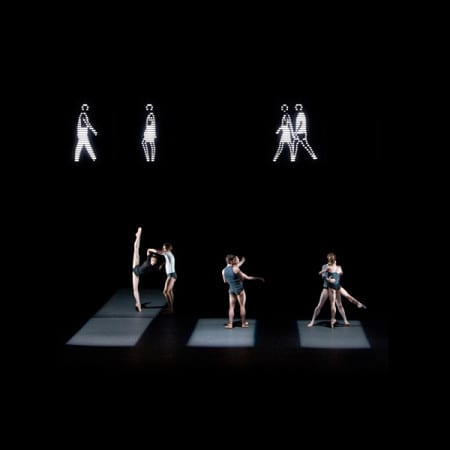
"Back in 2004 it really did feel like we were there at the start of this new “thing” and you could see it beginning to gain public interest, particularly with Max’s music being widely synched on TV, film and radio."
Before we get onto the subject of your hiatus, I wanted to ask about Max Richter. What was it like to have signed an artist who suddenly had a whirlwind of public attention around him?
We released “The Blue Notebooks” in 2004 and things didn’t take off immediately, but several months after the release there was a Pitchfork review which gave it 8.7 and that shifted things. Max has always been pursuing interesting projects and his music always seemed ripe for synchronisation with TV, radio and film, but it was pretty obvious from fairly early on with “The Blue Notebooks” that his music was going to be used a lot.
I don’t watch much TV, but there was a period when almost every night you’d hear his music being used on television trails or as backing music on BBC Radio 4. His music quickly seemed to become part of the cultural ether.
He got some great film and advert syncs and a host of great collaborations. His albums were all great projects to get involved in. I share a lot of his interests and so he was a real joy to work with. Same with Hasuchka or Jóhann Jóhannsson. The Miners Hymns project that we did with the BFI was brilliant.
Instead of working with bands on that conveyor belt of churning out album / single / tour dates, we were working with people who were interested in bigger cultural projects that were more collaborative, that were grappling with really interesting texts or subjects and were continually evolving creatively.
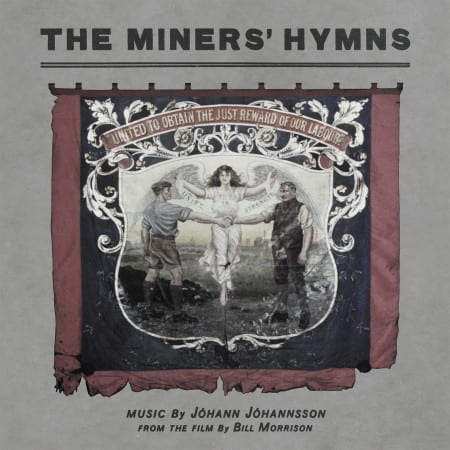
"It’s gutting to lose a catalogue like that and then see someone else claim it and repackage it with inferior artwork, but that’s part of being a label. You labour away with all these inspiring artists you draw together, thinking you’re creating this fantastic lasting edifice, only to realise that everything’s built on sand!"
Why did Max Richter leave the label?
Well, we loved working with Max and I know he felt likewise. We did five albums with him over eight years and saw his profile grow massively. Deutsche Grammophon are obviously this enormous old classical label who at some point in the past three or four years noticed what was going on and started to engage with it and they offered Max a lucrative deal for his whole catalogue.
We couldn’t compete with the money being offered and consequently, all his records (apart from “Memoryhouse“) have gone there. It’s gutting to lose a catalogue like that and then see someone else claim it and repackage it with inferior artwork, but that’s part of being a label. You labour away with all these inspiring artists you draw together, thinking you’re creating this fantastic lasting edifice, only to realise that everything’s built on sand!

"It felt like we were absolutely on top of our game and creating a wave. Then just weeks after the Barbican show, for reasons out of our control and which for legal reasons I can’t go into, we had to stop. We had to let the artists we signed go. We lost Dustin, Jóhann, Haushcka and Max Richter."
I want to talk about the label’s hiatus. Robert Raths of Erased Tapes has described 2012 as the tipping point for them in turns of their profile and yet, that was the year 130701 seemed to go silent. Why was that?
In early 2012 we were coming off the back of just releasing ‘The Miner’s Hymns’, two great Dustin O’Halloran albums, and a brilliant new Hauschka album. Max was premiering a chamber opera called ‘Sum’ and we put on the ‘Transcendentalists’ tour (and accompanying mini-album) through Europe with Jóhann Jóhannsson, Hauschka and Dustin O’Halloran selling out venues like the Barbican.
It felt like we were absolutely on top of our game and creating a wave. Then just weeks after the Barbican show, for reasons out of our control and which for legal reasons I can’t go into, we had to stop. We had to let the artists we signed go. We lost Dustin, Jóhann, Haushcka and Max Richter.
This label that we had put so much love into was smashed to bits. It was massively, massively frustrating. We had to hibernate for three years, during which time labels like Erased Tapes came to the fore, with people like Nils Frahm and Ólafur Arnalds well placed to get attention. I’m not saying this in a negative way, I like a lot of what they do and it’s done super smartly, but I can’t help feeling a touch resentful at being overlooked when we did so much to help open up that space.

"Now with the relaunch, we’re in a position where we can start signing new artists like Dmitry Evgrafov and Emilie Levienaise-Farrouch, and really start to push and expand the label again."
Most of the artists you had to let go have now signed with other imprints. Do you still have good working relations with those musicians?
We’ve still got really good relationships with them all. In fact, we’re reissuing a Haushcka record next year with virtually an album’s worth of unheard material and I’m hoping we’ll do more with Dustin.
Obviously things have changed significantly. Dustin has just won an Emmy. Jóhann was Oscar nominated and won a Golden Globe. Hauschka continues to do really well. Which is all brilliant, I’m genuinely chuffed for them. But now [with the relaunch], we’re in a position where we can start signing new artists like Dmitry Evgrafov and Emilie Levienaise-Farrouch, and really start to push and expand the label again.

"We hosted Emilie's demo on the section of our website where we stream the best demos people send to us, and when we re-booted 130701 she was another obvious person to go to."
How did you discover Dmitry and Emilie?
One of the signature traits of Fat Cat has been its openness and inclusivity, which goes back to its record store days stocking fanzines, mixtapes and releases that customers had made themselves. We’ve always signed a lot of artists from demos, and that’s how both Dmitry and Emilie arrived.
Dmitry was in contact several years ago when we were on hiatus; he’d put out “Pereehali“, which was this very sparse, beautiful piano record I helped him compile, where occasionally layers sounded like bark peeling off a tree. He was very young at this point and when we rebooted the label he was one of the first people I went back to. He’s still only 21 and is massively talented.
With Emilie, the more we listened to her music the more we realised she was doing something really beautiful. We hosted her demo on the section of our website where we stream the best demos people send to us, and when we re-booted 130701 she was another obvious person to go to. The way she integrates electronics with piano and strings is really smart; she used to work at Bleep.com and is really clued up when it comes to that [electronic] landscape.
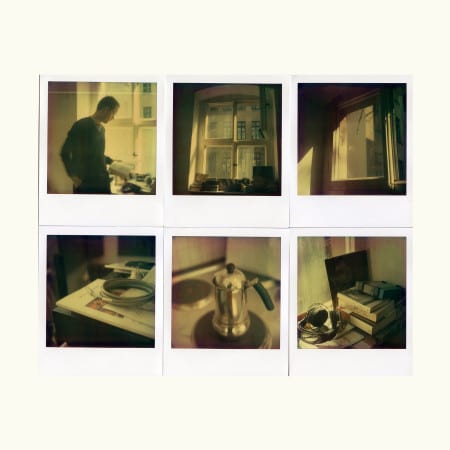
"I’m always most attracted to those artists who have a huge sense of personal integrity and vision and who pull against those definitions rather than accepting being easily defined within them. The challenge now is to keep unearthing those artists, to rebuild our networks and to keep ourselves vital."
What have been challenges in rebooting the label?
It’s been quite hard, partly because we’ve been away for so long and because both of the records we’re putting out are first albums from artists with no existing profile and who’ve yet to tour. So both are about building from the ground up. But I feel both are good artists who have huge potential and deserve attention.
We’ve got several others lined up, which I think will show a desire to expand our scope and direction. The [post-classical scene] is starting to become a statured landscape and I do hear a lot of derivative stuff, but I’m hoping that we can re-prove our quality and show that we’re doing something vital and adventurous again.
I understand why people need to use genre tags like ‘modern classical’ or ‘post-classical’, but I’m always most attracted to those artists who have a huge sense of personal integrity and vision and who pull against those definitions rather than accepting being easily defined within them. The challenge now is to keep unearthing those artists, to rebuild our networks and to keep ourselves vital.
Finally, next year is the 15th anniversary. What’s in the pipeline?
The anniversary is on the 13th July 2016 and we’re looking at doing a compilation and some live activity around that, which will hopefully involve some of the older artists as well as the newer ones. There’s a new website coming. There’s also four or five new releases and a reissue that will come out next year. 2016 is going to be our busiest year ever, so there’s a lot of excitement and fresh energy about being back and active.
Dmitry Evgrafov’s “Collage” is out on CD and digital now. Emilie Levienaise-Farrouch’s “Like Water With Sand” will be released on 13th November.
Discover more about 130701 on Inverted Audio.
130701: Pioneers of Post Classical – Mixtape
Dmitry EvgrafovDustin O'HalloranEmilie Levienaise-FarrouchHauschkaJóhann JóhannssonMax RichterSet Fire To FlamesSylvain Chauveau130701FatCat RecordsInstrumentalModern ClassicalPost Classical